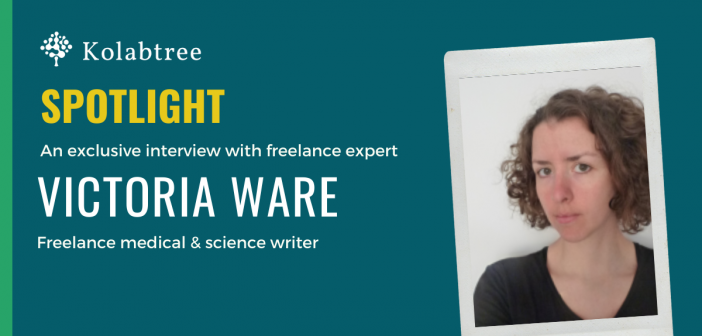Kolabtree’s freelance medical content writer Victoria Ware on doing a Masters degree whilst racing as a professional cyclist, what prompted her to explore the freelance writing sphere and how the pandemic has changed the perspective on remote working.
A freelance scientific and medical content writer, Victoria Ware has written for a variety of prestigious publications such as the Guardian, where she covers health, science and politics on a freelance basis. Some of her notable projects in the past have been in collaboration with institutions of great repute, such as the NHS and the Medical Research Council.
As part of the ‘Spotlight’ series, I had the chance to interview Victoria in order to understand her niche areas of expertise, personal journey and what motivated her to start offering on-demand expertise on Kolabtree.
NM: What prompted you to explore freelance medical writing?
VW: I did my Masters degree remotely while racing as a competitive/professional cyclist around Europe, and one of my cycling sponsors asked me to write an evidence-based blog as they knew I was interested and qualified in biological sciences. I really enjoyed it, exploring a new scientific area or a different angle on something I was already familiar with and finding a way to communicate the information in an appropriate way for the intended audience.
After that, I began writing for the cycling media with a focus on science. Over time I moved towards more technical and medical writing. I’ve always loved writing and the report writing and desktop research aspect of being a scientist was always my favourite part, so it was great to discover there were career paths that used those interests.
NM: You provide a variety of services ranging from technical writing to copywriting. What style of writing do you enjoy the most?
VW: What I really like about being freelance is the variety of projects I get to work on, and the insight I get into the way different organisations and teams work. I’m motivated by a challenge and by learning new things, so I wouldn’t say I prefer one kind of writing over another, but I really enjoy the variety of projects and the challenges each provides.
It’s really satisfying being able to help people bring to life an idea they have, or to really present a technical scientific product that’s been developed in a way that people can understand. I also enjoy wrapping my head around a complex clinical study protocol. So it really is the variety that keeps me interested, and to feel like I’m always learning.
NM: Do you have a specific research interest or subject specialization?
VW: At the moment I’m focused on health economic and outcomes research (HEOR) in oncology, so looking at real-world evidence for immunoncology medications and whether they work when used in the real world setting as opposed to a clinical trial. When writing about scientific topics, I enjoy projects focused on immunology, drug discovery and personalized medicine. I still write about cycling from time-to-time too.
NM: Why do you think companies have traditionally been reluctant to hire freelancers?
VW: I imagine it’s largely a fear of the unknown as taking on a freelancer for a given project is akin to employing someone – you need to know they’re the right fit for the job and are able to complete the project.
NM: How do you think the pandemic has shifted the perspective on remote working? Do you think this development is here to stay?
VW: I think it’s been a catalyst for a shift that was coming anyway. The technology exists to work remotely, and for a lot of people being able to work remotely allows them to do jobs that they might not otherwise have been able to. In that way, it’s opening doors. I would imagine some companies will want to revert to in-office working, but I imagine that will come down to if they can show their employees are being effective remotely and also whether they are able to adequately support their employees from a distance.
I think medical writing suits remote work but I couldn’t speak for other industries where the focus is on meetings etc. Another fact is the individual. I know some people love working from home while for others it is a huge challenge, and I wouldn’t like to see home working widening inequality with those who have access to enough peace and quiet and space to work from home having an advantage over those who don’t have that privilege. It’s a balancing act.
NM: What kinds of projects tend to be most challenging?
VW: There are different kinds of challenges, from being familiar with a given research area and understanding the science or statistics to quickly learning to work with a new team. There’s the more creative challenge of bringing to life the tone of a voice a client has in mind for their website or other written materials. These are all things I enjoy.
NM: What advice would you give to researchers seeking to become medical writers?
VW: If you want to be a freelance medical content writer and you’re reading this, you probably know on some level that this is the job for you. I think it’s quite common to only find out about medical writing as a career path after you’ve worked in a laboratory and feel like you enjoy the science but the lab work isn’t a good fit. And of course, you enjoy writing. You’ve really got to enjoy writing!
I think the first step would be to get any kind of writing experience, whether for a student magazine or otherwise, and just see whether you enjoy it and feel like you have an aptitude. An internship in a healthcare agency can be a really great tool to get a well-rounded insight into the medical communications industry and the types of projects you can work on, from publications to evidence development etc.
You’ll probably find out about all kinds of career paths you didn’t know about before. I think it’s probably a job you would either love or hate. So if you feel intrigued, do some reading around the topic and get some experience, then take it from there.
This piece is part of Kolabtree’s Spotlight feature, where we showcase the lesser-known aspects of our extensive network of freelance medical content writers, regulatory specialists and other PHD-qualified experts who are available for on-demand hire
Looking for a freelance medical content writer? Post a project for free on Kolabtree or scout from our wide network of freelance experts.







